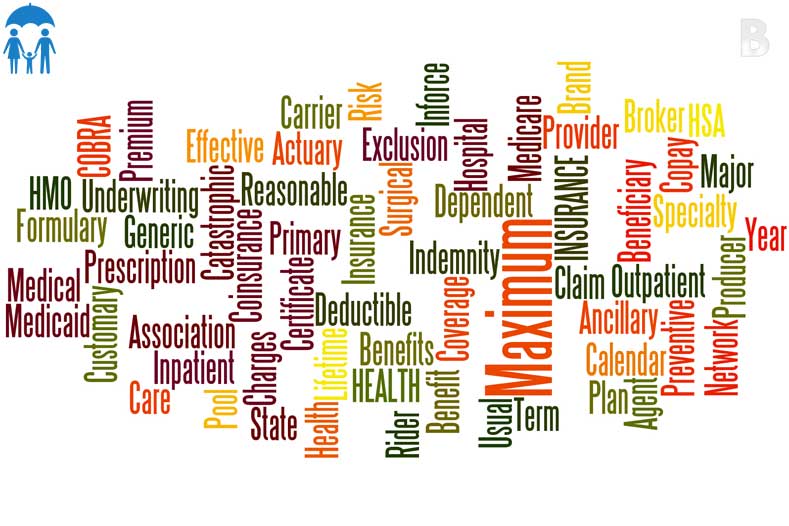L – Glossary of Insurance Terms
This page provides a glossary of insurance terms and definitions that are commonly used in the insurance business. New terms will be added to the glossary over time.
The definitions in this glossary are developed by the NAIC Research and Actuarial Department staff based on various insurance references. These definitions represent a common or general use of the term. Some words and/or phrases may be defined differently by other entities, or used in a context such that the definition shown may not be applicable. naic.org
L
Lapse – termination of a policy due to failure to pay the required renewal premium.
Level Premium Insurance – life insurance policy for which the cost is equally distributed over the term of the premium period, remaining constant throughout.
Liability – a certain or probable future sacrifice of economic benefits arising from present obligations of a particular entity to transfer assets or to provide services to other entities in the future as a result of a past transactions(s) or event(s). three essential characteristics: a) It embodies a present duty or responsibility to one or more other entities that entails settlement by probable future transfer or use of assets at a specified or determinable date, on occurrence of a specified event, or on demand; b) The duty or responsibility obligates a particular entity, leaving it little or no discretion to avoid the future sacrifice; and c) The transaction or other event obligating the entity has already happened.
Life – Endowment – insurance that pays the same benefit amount should the insured die during the term of the contract, or if the insured survives to the end of the specified coverage term or age.
Life – Flexible Premium Adjustable Life – a group life insurance that provides a face amount that is adjustable to the certificate holder and allows the certificate holder to vary the modal premium that is paid or to skip a payment so long as the certificate value is sufficient to keep the certificate in force, and under which separately identified interest credits (other than in connection with dividend accumulation, premium deposit funds or other supplementary accounts) and mortality and expense charges are made to individual certificates while providing minimum guaranteed values.
Life Settlements – a contract or agreement in which a policyholder agrees to sell or transfer ownership in all or part of a life insurance policy to a third party for compensation that is less than the expected death benefit of a policy.
Lifetime Disability Benefit – a provision in some disability income policies to recoup lost wages for the term of disability or remainder of insured’s life in case of permanent disability.
Limited Benefit – policies that provide coverage for vision, prescription drug, and/or any other single service plan or program. Also include short-term care policies that provide coverage for less than one year for medical and other services provided in a setting other than an acute care unit of the hospital.
Limited Payment Life Insurance – a form of whole-life insurance with a pre-defined number of premiums to be paid.
Limited Policies – health insurance coverage for a certain ailment, such as cancer.
Limits – maximum value to be derived from a policy.
Line of Business – classification of business written by insurers.
Liquor Liability – coverage for the liability of an entity involved in the retail or wholesale sales of alcoholic beverages, or the serving of alcoholic beverages, to persons who have incurred bodily injury or property damage arising from an intoxicated person.
Living benefits rider – a rider attached to a life insurance policy providing long term care for the terminally ill.
Lloyd’s of London – association offering membership in various syndicates of wealthy individuals organized for the purpose of writing insurance for a particular hazard.
Loan-backed Securities – pass-through certificates, collateralized mortgage obligations (CMOs), and other securitized loans not included in structured securities where payment of interest and/or principal is directly proportional to the interest and/or principal received by the issuer from the mortgage pool or other underlying securities.
Long Duration Contracts – contracts, excluding financial guaranty contracts, mortgage guaranty contracts and surety contracts, that fulfill both of the following conditions: (1) the contract term is greater than or equal to thirteen months and (2) the insurer can neither cancel nor increase the premium during the contract term.
Long-Term Care – policies that provide coverage for not less than one year for diagnostic, preventive, therapeutic, rehabilitative, maintenance, or personal care services provided in a setting other than an acute care unit of a hospital, including policies that provide benefits for cognitive impairment or loss of functional capacity. This includes policies providing only nursing home care, home health care, community based care, or any combination. The policy does not include coverage provided under comprehensive/major medical policies, Medicare Advantage, or for accelerated heath benefit-type products.
Long-Term Disability Income Insurance – policy providing monthly income payments for insureds who become disabled for an extensive length of time, typically two years or longer.
Loss – physical damage to property or bodily injury, Including loss of use or loss of income
Loss Adjustment Expense (LAE) – expected payments for costs to be incurred in connection with the adjustment and recording of losses. Can be classified into two broad categories: Defense and Cost Containment (DCC) and Adjusting and Other (AO). Can also be separated into (Allocated Loss Adjustment Expense) and (Unallocated Loss Adjustment Expense for ratemaking purposes.
Loss Frequency – incidence of claims on a policy during a premium period.
Loss of Use Insurance – policy providing protection against loss of use due to damage or destruction of property.
Loss Payable Clause – coverage for third party mortgagee in case of default on insured property, secured by a loan, that has been lost or damaged.
Loss Ratio – the percentage of incurred losses to earned premiums.
Loss Reserve – the amount that insurers set aside to cover claims incurred but not yet paid.
Loss Reserves – an estimate of liability or provision in an insurer’s financial statement, indicating the amount the insurer expects to pay for losses incurred but not yet reported or reported claims that haven’t been paid.
Losses Incurred – Includes claims that have been paid and/or have amounts held in reserve for future payment
Losses Incurred But Not Reported (IBNR) – An estimated amount set aside by the insurance company to pay claims that may have occurred, but for some reason have not yet been reported to the insurance company.




